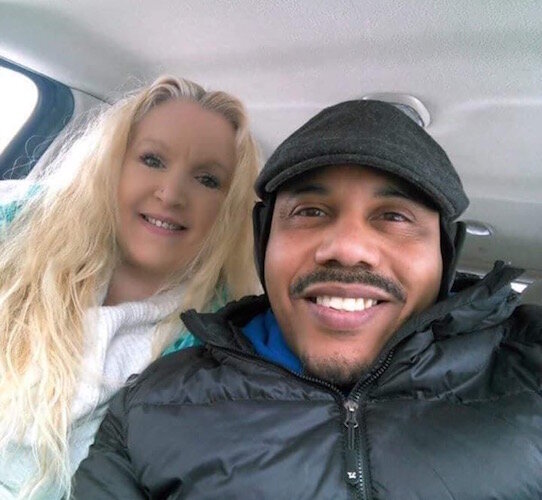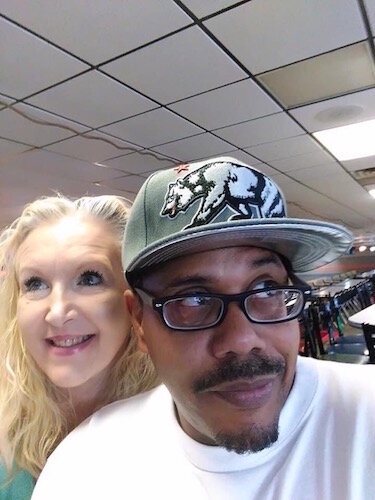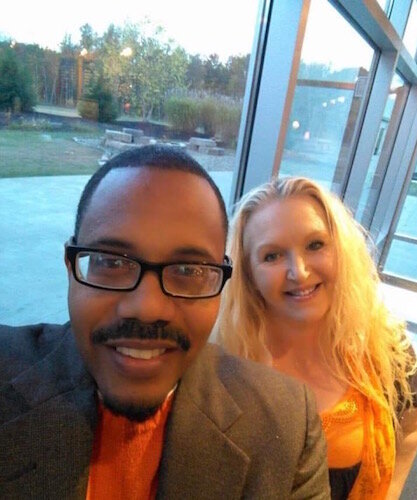Traumatic past prepares Raul Maysonet for life as a street minister in Battle Creek’s hot spots
From gang life, to a jail cell, Raul Maysonet found God had a plan for him and his wife Carrie.
Editor’s note: This story is part of Southwest Michigan Second Wave’s On the Ground Battle Creek series.
Carrie Maysonet says she didn’t know that the man she would marry and have four children with was a gang member who first would almost destroy her and then later give her the kind of life she had always hoped for.
The journey to the couple’s “happily ever after” was fraught with violence, addiction, and plenty of disappointments. Ultimately, they both say it was their faith in God that got them to where they are now – parents and grandparents living a relatively drama-free life in Battle Creek.
Raul, 50, left his life as a gang member 15 years ago and now spends his days as the Youth Pastor with Rhema Word Outreach Center on Capital Avenue and as the leader of Hood Church, which does outreach ministry in Battle Creek. He also is contracted through the Battle Creek Community Foundation to work as a Violence Interventionist in a program with the Battle Creek Police Department.
The couple’s story begins in Los Angeles where they met at a local dance club. At the time, Carrie was working a fulltime job and had no concept of the events leading up to Raul’s decision to be part of a gang. She was raised by a single mother, now 76, who owns her own business and several homes and continues to work.
“We never had welfare or food stamps and my mom continues to work very hard,” she says.
Her mother also made sure church was a big part of her children’s lives.
Raul’s backstory could not have been more different. He was raised by a single mother who was an addict and had three brothers who each were gang members. He didn’t know his father until he was 15.
At the dance club, Raul didn’t mention his gang activity focusing instead on talk of working on his first album and getting signed to a record label.
“He was a musician and he at that time was performing Latin Reggae and Hip Hop in English and Spanish,” Carrie says. “The gang members would come in and out of his life, but he was pretty focused on his music at that time.”
Their first of many arguments came one month after that first meeting when Carrie found out he had been using drugs. Raul said he wouldn’t do it again.
But, it continued to happen because that’s the life Raul knew. It began after his indoctrination into the gang way of life when he was 10-years-old.
“You live in the same neighborhood that they do, you grow up with them and their parents who are gang members. People watch you and target you and you’re thinking that you want what they have to offer because you don’t have any other options,” he says.
As far as he could tell, he didn’t have options and he says he began shedding any semblance of decency and honor to do what needed to be done to earn his way to “all of the prestige” that comes with being a part of the gang structure. He says he became cold-hearted and embraced viciousness and violence and did whatever he was told to do to prove his loyalty.
His was a life absent of structure and positive role models. Any privilege that may have been there was sucked away by young people who had a way out.
The majority of young men who join gangs are looking to belong and looking for love, Raul says.
“Honestly, and in its own twisted way, that’s what streets gangs provide. Unfortunately, it’s all counterfeit. It’s not something you can hang your hat on, but it will suffice for young men who need a place,” he says. “Some of these young guys will kill for you. These gang leaders are putting guns in the hands of these young men and telling them that ‘If you’re really down for the hood this is what you’re going to have to do to show it.’ It happened to me.
“The sad part of it is I definitely went along with all of the nonsense. I would have done anything to be praised, looked up to, and admired. I would have sold my soul twice for all of that.”
It would not be long before Raul began splitting his time between his gang and incarceration. His first stretch was a two-year stay at a juvenile home when he was almost 12. After that, he says he started losing track of the jails and prisons where he served time. The one thing he does remember is his prison number which he recited during this interview.
The traumas he experienced starting in his youth have caused him to draw a blank about specific dates and incidents. Others he cannot forget.
“When my little brother was shot to death on my birthday, I had to identify him. There was no trauma team for me. I was 26 when my mom was murdered in her home at point-blank range,” he says.
These losses and the lack of support to get him through it are among the reasons that Raul now dedicates his life to making sure that other young men at risk of gravitating towards the life he once led won’t go there.
His most visible role is with Hood Church, an outgrowth of his employment at Battle Creek’s Salvation Army where he previously volunteered as a dishwasher. He had applied twice for a job there but kept getting turned down because of his criminal record.
When Majors Kevin and Christie Van Zee were appointed as the Salvation Army’s new leadership, they noticed the connection Raul was making as he ministered to clients there and hired him as an administrative assistant and later they promoted him to an Outreach Sargent. This was in addition to supporting his ministry to others which grew to include a monthly Gospel and Hip Hop church service that was focused on the homeless and those who don’t feel comfortable going into a church.
After two-and-a-half years with the Salvation Army, Raul left to concentrate fulltime on his ministry with Hood Church, which was soon followed by his work with Rhema Word Outreach Center and the BCCF. The work with Hood Church is now focused on street outreach where he shares his faith in God with others.
“We bring the church to the streets and the community. We don’t have to have a physical building,” Raul says.
His ministry has led him to bridges where he has performed wellness checks on homeless veterans living there. He and his church also have put on events in the Post Neighborhood that included a visit from members of Western Day Cowboy Church who brought miniature horses for children to pet. They also built a big wooden cross and brought branding irons bearing the cross and fish symbols for people to use to brand the big cross.
Raul says this symbolized, “taking that which would have hurt us and releasing it and letting it go on the cross.”
One of the first events earlier in the summer done by his ministry was taking homeless people to Willard Beach for a swim, a meal, and baptisms for those who wanted to share in that sacrament. Through donations, the church was able to supply towels, food, and transportation.
“We go anywhere that we can target and bring our faith. We have a stage and sound system that we can plug in and use at the parks we go to,” Raul says. “We’re led by the Lord to pick hotspots. In the community, there are places known for lots of drama, pain, shootings, and heartache. To be able to cover all of those areas in Battle Creek it will take quite a bit of time.”
Home was always out of bounds
In the beginning, Raul worked hard to make sure that his gang activity didn’t bleed into his life with Carrie. Five years after meeting they got married for the first time. That union disintegrated after seven-and-a-half years because Carrie could no longer endure her husband’s repeated “falls off of the proverbial wagon.”
There was no doubt in her mind that her husband was an addict and unwilling to get clean at the time.
Raul says for seven years now he has been “clean and sober from everything you could imagine — addiction to porn, the streets, and drugs.”
Rather than waiting for her husband to go through the fall that would see him rise a different man, Carrie created a life without him.
On her own and pregnant for the second time, Carrie found support through a group at the church she was attending for pregnant women who didn’t know if they were going to keep their babies. Some of these women also were either dealing with or coming out of addiction and domestic violence issues.
Unemployed at the time, Carrie received a grant secured through the program to cover the cost of utilities and was receiving Food Stamps and welfare assistance – things she never thought she would be relying on.
“It was up to me to keep the kids clothed and fed,” she says.
During this time Raul was coming in and out of her life and their children’s lives. She eventually got a full-time job with the corporate offices of the self-storage company Public Storage and was making a good living.
She says she tried hard to keep the marriage together because the vows mean something to her, but she finally reached a breaking point and made the decision to move to the Portland, Ore., area where her mother had purchased a house for her and her children and she had found a job with an up and coming business.
Nine years later, Raul reappeared after what would be his final fall and started making amends and doing the hard work of becoming the man he is today. He had been in jail in Vancouver, Wash., and had overheard a pastor offering to do whatever he could to help a fellow inmate.
“The thought came to me that he was being fathered and everything was cloaked in that. I said, ‘God, I want to be fathered like that. I almost felt that he made an imprint in my soul after I said that prayer,” Raul says. “At that moment in my heart, it sounds crazy but it’s true, at that very moment I heard a voice inside of my being and the voice said ‘I got you covered.’
“I understand it then and now. It meant, ‘I got your back. I’ll be what you don’t have. I’ll be your supplier and give you the love you didn’t have in the streets.’ That was the turning point. I was an addict and all I really wanted to do was sell dope, get high, and I was into prostitution and porn. At that moment, I lost the desire for all of that.”
Raul and Carrie reconciled and remarried and tried to find a house in the Portland area. Her mother sold the house she and the children had been living in because she wasn’t happy with her daughter’s decision to take Raul back.
Unable to find a home in Oregon, the couple decided to move to Michigan where they had a son living in Grand Rapids. They found a house in Battle Creek and have been there ever since.
“I don’t even know why she wanted to stick around with me,” Raul says of Carrie.
She says God had told her that she and Raul would get married again.
“I’m thankful to God that he brought us together again. The things we have been through have made our relationship and our appreciation of God and ourselves even stronger,” Carrie says. “I’m glad that that part of our life that almost destroyed us is over with.”

















